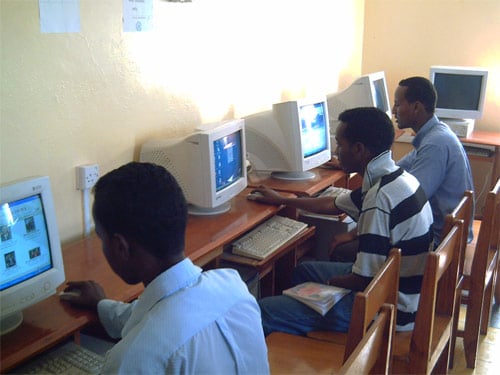Internet Addiction Hits Home: U.S. Students "Feel Withdrawals" When Disconnected
We've seen this problem before. Internet addiction has become a serious
issue in some of the more well-connected nations, with South Korea, the
UK and even China setting up Internet addiction therapy clinics in
order to help people curb their use of the Web and re-connect with the
real humans around them. So far, there hasn't been too much talk of a
similar epidemic in the United States, but a new study is shedding
light on what some would say is an obvious problem.
Today, U.S. college students are more connected than ever, with near-everywhere Wi-Fi, always-on smartphones and a good excuse to be online most of the day (studying, of course!). Researchers at the University of Maryland surveyed 200 students, asking them to give up all media for 24 hours. Those who participated did just that, after the study found that a surprising amount of students "showed signs of withdrawal, craving and anxiety with an inability to function well without their media and social links." In our opinion, this isn't all that surprising.

Susan Moeller was chosen to lead up the study, and she found that many students "wrote about how they hated losing their media connections, which some equated to going without friends and family." The wild part is, most students know it, yet still can't shake it. With many addictions, admission is the first hurdle before kicking the habit; with the Internet, it seems different. Many people understand that they're addicted, but given the connected society in which we live, many never find a reason to change. One student stated that they were "clearly addicted, and the dependency is sickening," while others simply complained about their "need" to see text messages, instant messages, e-mail and Facebook updates.
Many students even equate Internet addiction with comfort. One student noted that "texting and IM'ing friends gives them a constant feeling of comfort," and they felt "alone and secluded" whenever they were away from a live Internet connection. Potentially more shocking was that few students reported a desire to watch the TV news or read a newspaper; it was the Internet or nothing.

So, is this the future of our generation? Are we destined to live in front of continually updated boxes? That's probably a bit extreme, but there's no doubt that the danger of becoming addicted to the Internet is greater now than ever before.
Today, U.S. college students are more connected than ever, with near-everywhere Wi-Fi, always-on smartphones and a good excuse to be online most of the day (studying, of course!). Researchers at the University of Maryland surveyed 200 students, asking them to give up all media for 24 hours. Those who participated did just that, after the study found that a surprising amount of students "showed signs of withdrawal, craving and anxiety with an inability to function well without their media and social links." In our opinion, this isn't all that surprising.

Susan Moeller was chosen to lead up the study, and she found that many students "wrote about how they hated losing their media connections, which some equated to going without friends and family." The wild part is, most students know it, yet still can't shake it. With many addictions, admission is the first hurdle before kicking the habit; with the Internet, it seems different. Many people understand that they're addicted, but given the connected society in which we live, many never find a reason to change. One student stated that they were "clearly addicted, and the dependency is sickening," while others simply complained about their "need" to see text messages, instant messages, e-mail and Facebook updates.
Many students even equate Internet addiction with comfort. One student noted that "texting and IM'ing friends gives them a constant feeling of comfort," and they felt "alone and secluded" whenever they were away from a live Internet connection. Potentially more shocking was that few students reported a desire to watch the TV news or read a newspaper; it was the Internet or nothing.

So, is this the future of our generation? Are we destined to live in front of continually updated boxes? That's probably a bit extreme, but there's no doubt that the danger of becoming addicted to the Internet is greater now than ever before.

